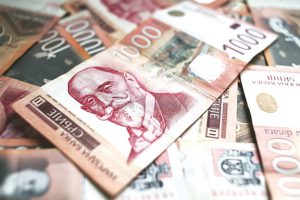Bloomberg
Serbia lifted its benchmark interest rate more than expected to the highest level since early 2018 as the Balkan nation steps up efforts to tame accelerating inflation.
The central bank raised its one-week repurchase rate by half a percentage point to 3.5%. Most analysts expected a hike of 25 basis points, with five of 17 correctly predicting the move.
“In the conditions of continued price pressures as well as acceleration in imported inflation, it’s necessary to continue with tightening of monetary conditions,†the central bank said. It described the move as an “adequate reaction to stronger inflationary pressures, without undermining further growth in economic activity.â€
Policy makers also shifted the credit and deposit rates by 50 basis points to 2.5% and 4.5% respectively.
Officials at the National Bank of Serbia only began raising rates to confront accelerating inflation in April, months after most of their regional peers. After three initial half-point hikes from April to June, the rate setters slowed the pace with two quarter-point increases in July and August.
“We expect the NBS will follow and continue to gradually tighten its policy despite relatively widespread fears of growth slowdown,†analyst Mate Jelic at Erste Group said in a note. The bank issued a forecast for a 4.5% rate by the end of the year on risks of hardening expectations and a wage-price spiral.
“Any earlier hopes that this energy shock is temporary have evaporated,†Jelic said.
Serbia’s annual inflation rate climbed over the past year to 12.8% in July — the highest in almost a decade — far outstripping the central bank’s tolerance band of 1.5%-4.5%.
Headline inflation will probably peak in September at around 14%, central bank Governor Jorgovanka Tabakovic said last month, as the monetary authority revised its previous forecast upward due to protracted pressure from food and energy prices.
The central bank kept its economic growth projection of 3.5%-4.5% for this year but noted that the risks are skewed to the downside due “strenghtening recessionary pressures in the euro zone,†Serbia’s biggest trading partner.
 The Gulf Time Newspaper One of the finest business newspapers in the UAE brought to you by our professional writers and editors.
The Gulf Time Newspaper One of the finest business newspapers in the UAE brought to you by our professional writers and editors.
